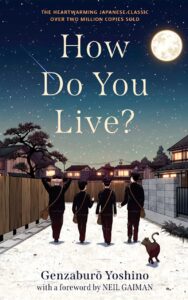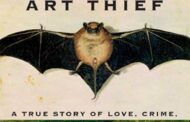Book Short
‘How Do You Live?’
A Japanese Classic on Ethical Living
Review by Stephanie Miller

Every young teenager should have a kind and loving uncle (or aunt or mentor) to provide just the right bit of timely insight and guidance on the big questions of life. What is my place in the world? What is the duty of a loyal friend? Is it possible to apologize sufficiently when we hurt another? How much of my success is due to luck — or fate?
“How Do You Live?” is a Japanese classic, written by Genzaburo Yoshino in 1937 as a way to introduce ethics and culture to middle school students. He was asked to create a textbook but knowing young people (and most adults) don’t easily learn that way, he wrote a story instead. It became an instant bestseller as students talked about it at home and remains a beloved guide to mindful living around the globe. It was translated into English in 2021.
The story follows fifteen-year-old Honda Jun’ichi, nicknamed Copper, who faces enormous changes in his life after the death of his father. We read about his teenaged angst, moments of curiosity at school, new friendships, tests of loyalty, his exploration of the world’s heroes, along with the sadness and joy of everyday life. Luckily, he has his uncle to turn to. After they talk, his uncle’s compassionate insights are captured in a journal being kept as a life navigation tool for Copper when he’s ready.
It’s a strange, wise book. The story is of Copper dealing with the typical school age dramas of friendship and bullying and bravery and cowardice. Interspersed are essays on personal ethics and scientific thought. It’s an odd reading experience. These two parts of the book contrast each other, but each is essential.
We realize it’s never too late to start living the life you want. For example:
”If it means anything at all to live in this world, it’s that you must live your life like a true human being and feel just what you feel.”
”You should collect as many experiences [as you can], and while you do, always be true to that voice in your heart.”
Our wise uncle is not afraid to ask hard questions. When we explore what it means to be a hero by looking at Napoleon, whose life story is still widely read today, he says, “While we can admire Napoleon’s great vitality… we can also ask the question, ‘What in the world did Napoleon, with this wonderful vitality, accomplish [for humanity]?’”
Uncle tells us, “It’s hard to admit our mistakes. But in the pain of our mistakes there is also human greatness. If we were not born with the ability to conduct ourselves with morality, there would be no reason for bitter tears.”
Out of context, these quotes may feel preachy. Yet without the uncle’s wisdom, Copper’s story is simply ordinary. The result is a gentle, kind, approachable, and contemplative guide for young adults finding their way in the world. And who among us of any age, I ask you, is not in need of some wayfinders as we travel?
Micro Shorts
Tom Lake, by Ann Patchett
All that I love about Ann Patchett’s writing is in her latest novel, “Tom Lake.” Lyrical, almost lush backdrops for well-drawn characters who seem ordinary at first, but always turn out to be living the kind of cool, quirky, thoughtful, and emotionally substantive lives that we admire.
In “Tom Lake,” we meet Lara and her three grown daughters picking cherries on the family farm during the first year of the pandemic. They badger her for all the details of what seems to them to be the finest days of her youth, when she spent a season as an actress co-starring in “Our Town” at the summer theater festival at Tom Lake with a man who went on to become a famous movie star. It’s a novel, so of course that summer was a seminal experience in Lara’s life, and as the story progresses, also pivotal for everyone she knew at the theater.
It’s a story about longing – for career dreams, unrequited love, friendship, and finding a life that makes you happy. Patchett weaves a theme throughout: When we look back on our life (or look forward, as Lara’s daughters are doing), are we content with our choices? This is not my favorite of Patchett’s work (see below), but it’s a quietly flowing, slightly dull, good summer read.
‘The Magician’s Assistant,’ by Ann Patchett
When I borrowed her latest novel from the library, I picked up the only other one they had which I hadn’t read yet. Good job, me, because it’s now my favorite, surpassing even “Bel Canto” and “State of Wonder” for storyline, ever evolving plot reveals, excellent research, and beautiful, loving friendships.
When Parsifal The Magician dies young, his assistant Sabine, who has given up romance for him for 23 years, despite the fact that he’s gay, finds that the family she was told died in a car crash decades ago is actually alive and well in Nebraska. In grief, she agrees to meet with them. Surprise! They like each other!
Since everything Parsifal told her about his past was wrong, does she really know him? This man she worked with, lived with, loved fervently for her entire adult life? Somehow, Sabine begins to see that despite the sleight of hand about his family during his life, she is somehow the right person to connect him with his family after death. Maybe that is how he planned it.
I loved Sabine for her understated talents, steadfast love and friendship, good humor, and ability to forgive. Patchett parcels out the story slowly, and with each reveal, creates the joy and awe we feel watching a magician pull something else out of that beautiful, mysterious hat.
‘Modoc: The True Story of the Greatest Elephant That Ever Lived,‘ by Ralph Helfer
Smell the popcorn. Listen for the calliope music and… Step right up, Ladies and Gentlemen! This is a true-life love story of a boy and an elephant, born on the same day in a small German circus town. Over seventy years and three continents, the bond between Modoc and her boy-best friend-trainer, Bram, grows as they survive together a shipwreck off the coast of India, an attack by bandits during an apprenticeship with the legendary Mahout elephant trainers in the Indian teak forests, and their rise to circus stardom in 1940s New York City.
Modoc was an amazing creature — smart, savvy, loyal, and strong. She was a loving, kind, and patient friend. The book explores the ethical issues around performing and working animals and the effectiveness of using love instead of violence to train wild animals. It’s a story of loyalty, friendship, and adventure for animal lovers everywhere.
‘Satori,’ by Don Winslow
This is an adventure spy novel to top all other adventure spy novels. It’s based on the bestselling Shibumi by Tevanian (which I had never heard of!) and serves as a prequel to that classic saga of highly ethical espionage killer Nicholai Hel. It’s a wonderful recreation of the global power struggles in Asia in 1951-52, the years when “Uncle Joe” Stalin and Mao warily circled each other while trying to build a Communist bloc across the continent and before the Americans got into Vietnam. In these high stakes Cold War era spy games, it’s always hard to figure out who is the good guy. Along with his unique blend of East-West sensibility, Hel is both a Japanese martial arts specialist and a master of the impossibly complicated board game Go.
This is a sophisticated page turner. I recommend it for the beach or lake, but you may find yourself so engrossed you forget to enjoy the water!





